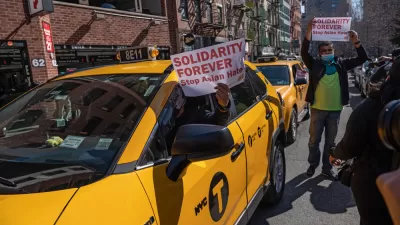An expert panel convened to discuss the effect of the coronavirus on the foundations of society and contemporary life. The future, both the remaining time dealing with the pandemic and after, is becoming more clear with every passing day and week.
The most common request I have received as managing editor of Planetizen since the outset of the coronavirus crisis has been to use the website to field a conversation, and debate, about the future of urban planning and design, focusing on questions about density, transportation, and urban design.
The course preview above offers a taste of Planetizen's first remote panel for the Planetizen Courses platform. The beginning of the "The Future of Cities After COVID-19" discussion is available in the YouTube video above, but the full recording of the panel is available for free, and for AICP CM credit, on the Planetizen Courses website.
The participants, Allison Arieff, William Fulton, Scott Frazier, and Mariela Alfonzo, each bring a unique perspective and eloquence to the discussion. The panel starts out, as shown in the video above, by discussing beginning to develop a framework of understanding for the emerging debate about the future of communities. Speculation and opinions about the future have ranged from predictions about the viability of public transit to the future of the housing market and even to the minutiae of elevators and hallways. Planetizen gathered a collection of articles detailing the earliest episodes on of this this debate at the outset of the crisis in the United States, and on numerous occasions since. Elsewhere on the Internet, Brent Toderian has taken the mantle on one side of the issue, Joel Kotkin the other.
"The Future of Cities After COVID-19" panel dove into specifics about data and policies, but also offered productive insights to help understand the crisis and its potential to generate change. The panel serves as a reminder that humans influence environments, and vice versa, and offers a call to action for planners, urban designers, politicians, and the public to start advocating and working for the future they would like to see emerge from this crisis. For additional references cited in the panel discussion, see below:
- Texas Losing its Housing Affordability Advantage (Planetizen, April 15)
- Could cars emerge with a better image when SF emerges from coronavirus emergency? (San Francisco Chronicle, April 14)
- A Rare Chance for Urban Innovation (Planetizen, April 14)
- Early Indications of Car Industry's Future Emerge (Planetizen, April 14)
- Race, Planning Intersect as the Coronavirus Kills Black and Latino Americans at Higher Rates (Planetizen, April 14)
- Opinion: Transit Has Always Been an Essential Service (Planetizen, April 13)
- Your Covid Stories: Citymakers Share Their Hopes, Fears, and Little Everyday Moments... (State of Place, April 8)
- How Coronavirus Will Change Cities, From Public to Private Lives (Planetizen, April 1)
- Applying the Lessons of COVID-19 to Climate Change (Planetizen, April 1)
FULL STORY: The Future of Cities After COVID-19

Maui's Vacation Rental Debate Turns Ugly
Verbal attacks, misinformation campaigns and fistfights plague a high-stakes debate to convert thousands of vacation rentals into long-term housing.

Planetizen Federal Action Tracker
A weekly monitor of how Trump’s orders and actions are impacting planners and planning in America.

In Urban Planning, AI Prompting Could be the New Design Thinking
Creativity has long been key to great urban design. What if we see AI as our new creative partner?

King County Supportive Housing Program Offers Hope for Unhoused Residents
The county is taking a ‘Housing First’ approach that prioritizes getting people into housing, then offering wraparound supportive services.

Researchers Use AI to Get Clearer Picture of US Housing
Analysts are using artificial intelligence to supercharge their research by allowing them to comb through data faster. Though these AI tools can be error prone, they save time and housing researchers are optimistic about the future.

Making Shared Micromobility More Inclusive
Cities and shared mobility system operators can do more to include people with disabilities in planning and operations, per a new report.
Urban Design for Planners 1: Software Tools
This six-course series explores essential urban design concepts using open source software and equips planners with the tools they need to participate fully in the urban design process.
Planning for Universal Design
Learn the tools for implementing Universal Design in planning regulations.
planning NEXT
Appalachian Highlands Housing Partners
Mpact (founded as Rail~Volution)
City of Camden Redevelopment Agency
City of Astoria
City of Portland
City of Laramie





























